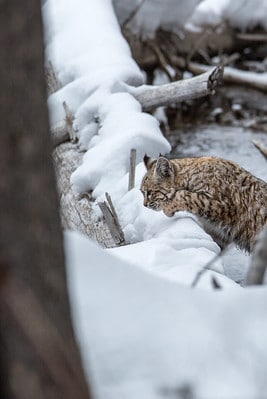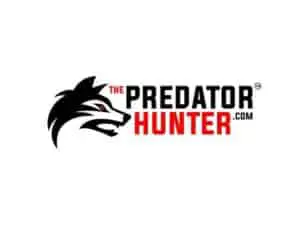There are some very complicated laws for hunting bobcats in Wisconsin. This article contains many, but not all of the regulations. Every hunter must check for changes to federal, state, and local laws before they make their first stand. Always hunt legally and safely!

In Wisconsin, bobcat hunting residents need a small game hunting license, and non-residents must have a furbearer license. A bobcat permit and tag are required to hunt a bobcat. There is a daily bag limit of one. The season runs from Oct. 15 – Dec. 25, 2022, and Dec. 26, 2022 – Jan. 31, 2023.
Purchase a Wisconsin hunting license here.
Check out the Wisconsin hunting seasons.
Related: Read this article to learn how to hunt a bobcat!
Related: Read this article to check the laws for hunting coyotes in Wisconsin.
Related: Learn the rules for hunting fox in Wisconsin.
General laws for hunting bobcats in Wisconsin.
Electronic callers. As seen in the video above, these are legal to use when hunting bobcats in Wisconsin.
While electronic callers are expensive, mouth and hand callers are cheaper but harder to use.
Read this article and watch the video to learn how to use a closed reed rabbit squealer.
Follow along as call manufacturer Brian Rush shows you three open reed calls you can learn and use today.
You can check the price for an electronic caller on Amazon.
Decoys are legal. You can read about some highly effective but inexpensive ($20) coyotes decoys here.
Suppressors. Legal, if you hold a federal license to possess the device.
Night hunting. Night hunting bobcats in Wisconsin is not permitted.
Register early to hunt bobcats in Wisconsin.
The application deadline for a bobcat permit or preference point is August 1.
Bobcat permits may be transferred to youth under age 18 or to a person possessing a valid Class A, B, C or D disabled hunting permit no later than 15 days before the open season.
Youth permits for hunting bobcats in Wisconsin.
A youth receiving the permit will retain any accumulated preference points.
Preference points may also be transferred from a deceased person to a youth. For more information, visit dnr.wi.gov and search “transfer permit.”
Wisconsin DNY Permit application for bobcat hunting.
The Wisconsin DNR regulates the harvest of bobcat and fisher through a special permitting system. Harvest permits, or kill tags, are awarded through a “preference point” lottery system. To receive a kill permit for one species, you must apply by the annual deadline and be a drawing winner. Results from the drawing are posted annually, and permits are mailed to successful applicants.
Where to submit applications for bobcat hunting.
Applications can be submitted by:
- visiting a DNR Service Center;
- visiting a license sales location;
- using the Online Licensing Center.
The application fee for a fisher permit is $3, and the application fee for a bobcat permit is $6. Applicants can apply for a preference point only or be entered into the drawing for a permit(s).
Notice: Applicants who successfully draw a fisher tag; or successful bobcat applicants who intend to trap must also purchase a trapping license. You must first attend a trapper education course before applying for a bobcat or fisher tag to ensure all requirements are fulfilled before the start of harvest seasons. Before purchasing a license, all first-time trappers are required to complete the Wisconsin trapper education course unless actively engaged in farming.
Special Note:
- If an applicant chooses to enter the drawing and is selected for a permit, the applicant will lose all preference points, even if the permit is not used.
- Remember to apply. Applicants who do not apply for either a preference point or a permit at least once during three consecutive years will lose all previously accumulated preference points.
- Conservation patron license holders who did not submit their application choices for fisher when they purchased their license must now apply online or through a DNR office that offers counter service.
- The deadline to submit application choices for bobcat and fisher permits is posted online. Applicants who apply for a bobcat permit must choose one of the two bobcat seasons.
Bobcats harvested must be reported and tagged by Wisconsin law.
• You are required to possess a bobcat harvest permit and unfilled carcass tag for the appropriate bobcat management zone while hunting bobcat.
• Immediately upon dispatching a bobcat, the pelt tag must be validated and attached. Validate the tag by slitting the month and date of kill on the tag. Attach the validated pelt tag to the carcass using wire or other similar attachment device and passing it through the animal’s mouth to eye opening, just beneath the skin.
• You must notify the DNR within 24 hours of the harvest by visiting gamereg.wi.gov or by calling 844-GAME-REG (844-426-3734) AND you must exhibit your bobcat to an authorized DNR representative (usually a conservation warden) for registration and tagging no later than seven days after the month of harvest. The bobcat pelt must be separated from the carcass and both parts must be presented at the time of registration and tagging.
• The registration tag shall remain attached to the pelt until removed by a fur dresser or taxidermist at time of preparation.
• You may not possess bobcat pelts longer than seven days after the month of harvest without registering the pelt with an authorized DNR representative.
• No person may transfer, give, trade, sell or purchase any bobcat pelt unless it bears a DNR carcass tag and registration tag attached by an authorized DNR representative.
• The bobcat carcass will be retained by the DNR for research purposes. Carcasses are used for determining population trends which aid in establishing harvest quotas. Hunters and trappers may keep meat from bobcat carcasses as long as the skull and body cavity, including all internal organs remain intact.


